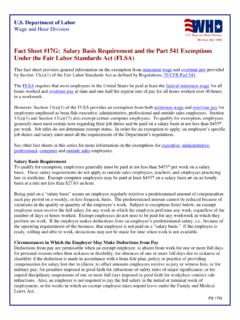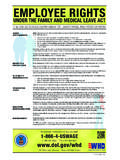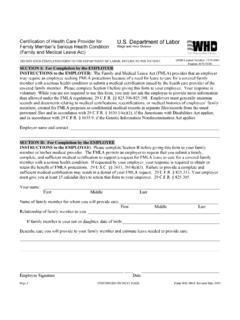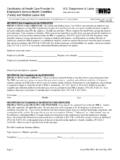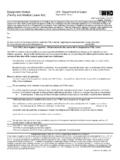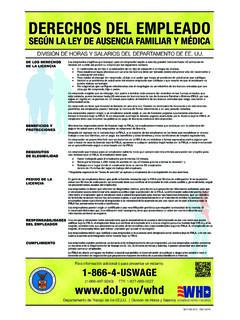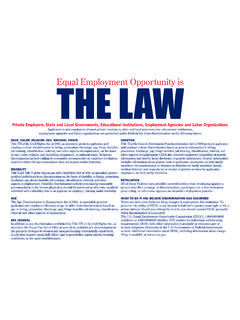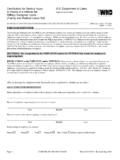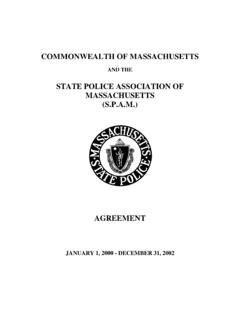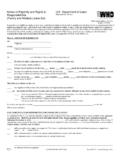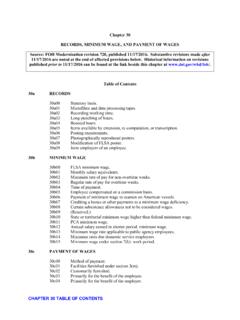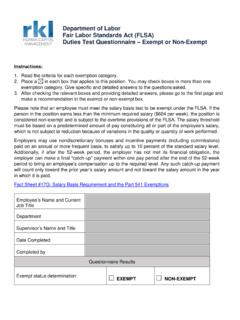Transcription of U.S. Department of Labor Wage and Hour Division - DOL
1 *Note: The Department of Labor revised the regulations located at 29 part 541 with an effective date of January 1, 2020. WHD will continue to enforce the 2004 part 541 regulations through December 31, 2019, including the$455 per week standard salary level and $100,000 annual compensation level for Highly Compensated Employees. The final rule is available at: Department of Labor Wage and Hour Division (Revised September 2019) Fact Sheet #17D: exemption for professional Employees Under the fair Labor standards Act ( flsa )T his f act sheet provides information on the exemption from minimum wage and overtime pay provided by Section 13(a)(1) of the flsa as defined by Regulations, 29 Part 541, as applied to professional employees. T he flsa requires that most employees in the United States be paid at least the f e de ra l m inim um wage for all hours worked and overtime pay at not less than time and one-half the regular rate of pay for all hours worked over 40 hours in a workweek.
2 However, Section 13(a)(1) of the flsa provides an exemption from both minimum wage and overtime pay for employees employed as bona fide executive, administrative, professional and outside sales employees. Section 13(a)(1) and Section 13(a)(17) also exempt certain computer employees. To qualify for exemption , employees generally must meet certain tests regarding their job duties and be paid on a salary basis at not less than $684* per week. Job titles do not determine exempt status. In order for an exemption to apply, an employee s specific job duties and salary must meet all the requirements of the Department s regulations. The specific requirements for exemption as a bona fide professional employee are summarized be low. There are two general types of exempt professional employees: le a rne d prof e s s iona ls a nd c re a t iv e prof e s s iona ls . See other fact sheets in this series for more information on the exemptions for executive, a dm inis t ra t iv e, computer and out s ide s a le s employees, and for more information on the salary basis requirement.
3 Learned professional exemption To qualify for the learned professional employee exemption , all of the following tests must be met: The employee must be compensated on a salary or fee basis (as defined in the regulations) ata rate not less than $684* per week; The employee s primary duty must be the performance of work requiring advancedknowledge, defined as work which is predominantly intellectua l in character and whichincludes work requiring the consistent exercise of discretion and judgment; T he advanced knowle dge m us t be in a f ie ld of s c ie nc e or le a rning; a nd2 T he advanced knowledge must be customarily acquired by a prolonged course of specialized int e lle c t ua l ins t ruc t ion. Primary Duty Primary duty means the principal, main, major or most important duty that the employee performs. De t e rm ina t ion of a n e m ploy e e s prim a ry dut y m us t be ba s e d on a ll t he f a c t s in a pa rt ic ula r case, with the major emphasis on the character of the employee s job as a whole.
4 Work Requiring Advanced Knowledge Work requiring advanced knowledge means work which is predominantly intellectua l in character, and which includes work requiring the consistent exercise of discretion and judgment. Prof e s s iona l work is therefore distinguis hed from work involving routine mental, manual, mecha nic a l or phy s ic a l work. A professional employee generally uses the advanced knowledge to analyze, interpret or make deductions from varying facts or circumstances. Advanced knowledge cannot be attained at the high s c hool le v e l. Field of Science or Learning F ie lds of s c ie nc e or le a rning inc lude la w, m e dic ine , t he ology , a c c ount ing, a c t ua ria l c om put a t ion, e ngine e ring, a rc hit e c t ure , t e a c hing, v a rious t y pe s of phy s ic a l, c he m ic a l a nd biologic a l s c ie nc e s , pharmacy and other occupations that have a recognized prof e s s iona l s t a t us a nd a re dis t inguis ha b le from the mechanical arts or skilled trades where the knowledge could be of a fairly advanced type, but is not in a f ie ld of s c ie nc e or le a rning.
5 Customarily Acquired by a Prolonged Course of Specialized Intellectual Instruction T he le a rne d prof e s s iona l e x e m pt ion is re s t ric t e d t o prof e s s ions whe re s pe c ia liz e d a c a de m ic t ra ining is a standard prerequisite for entrance into the profession. The best evidence of meeting this requirement is having the appropriate academic degree. However, the word customarily means the exemption may be available to employees in such professions who have substantially the same knowledge level and perform substantially the same work as the degreed employees, but who attained the advanced knowledge through a combination of work experience and intellectua l instruction. T his exemption does not apply to occupations in which most employees acquire their s kill by e x pe rie nc e ra t he r t ha n by a dv a nc e d s pe c ia liz e d int e lle c t ua l ins t ruc t ion. Creative professional exemption T o qua lif y f or t he creative professional employee exemption , all of the following tests must be met: The employee must be compensated on a salary or fee basis (as defined in the regulations) at a rate not less than $684* per week; and T he employee s primary duty must be the performance of work requiring invention, im a gina t ion, origina lit y or t a le nt in a re c ogniz e d f ie ld of a rt is t ic or c re a t ive endeavor.
6 3 Invention, Imagination, Originality or Talent T his requirement distinguis hes the creative professions from work that primarily depends on int e llige nc e , dilige nc e a nd a c c ura c y . exemption as a creative professional depends on the extent of t he inv e nt ion, im a gina t ion, origina lit y or t a le nt e x e rc is e d by t he e m ploy e e . Whether the exemption applies, therefore, must be determined on a case-by -case basis. The requirements are generally met by actors, musicians, composers, soloists, certain painters, writers, cartoonists, essayists, novelists, and others as set forth in the regulations. Journalists may satisfy the duties requirements for the c re a t iv e prof e s s iona l e x e m pt ion if t he ir prim a ry dut y is work re quiring inv e nt ion, im a gina t ion, origina lity or talent. Journa lis t s a re not e x e m pt c re a t iv e prof e s s iona ls if t he y only c olle c t , orga niz e and record information that is routine or already public, or if they do not contribute a unique interpretation or analysis to a news product.
7 Recognized Field of Artistic or Creative Endeavor T his inc lude s s uc h f ie lds a s , f or e x a m ple , m us ic , writ ing, a c t ing a nd t he gra phic a rt s . Teachers T eachers are exempt if their primary duty is teaching, tutoring, instructing or lecturing in the activity of imparting knowledge, and if they are employed and engaged in this activity as a teacher in an e duc a t iona l e s t a blis hm e nt . Exempt teachers include, but are not limited to, regular academic teachers; kindergarten or nursery school teachers; teachers of gifted or disabled children; teachers of s kille d a nd s e m i-s kille d t ra de s a nd oc c upa t ions ; t e a c he rs e nga ge d in a ut om obile driv ing ins t ruc t ion; aircraft flight instructors; home economics teachers; and vocal or instrument music teachers. T he salary and salary basis requirements do not apply to bona fide teachers.
8 Having a primary duty of t e a c hing, t ut oring, ins t ruc t ing or le c t uring in t he a c t iv it y of im pa rt ing knowle dge inc lude s , by it s v e ry nature, exercising discretion and judgment. Practice of Law or Medicine A n e m ploy e e holding a v a lid lic e ns e or c e rt if ic a t e pe rm it t ing t he pra c t ic e of la w or m e dic ine is e x e m pt if t he e m ploy e e is a c t ua lly e nga ge d in s uc h a pra c t ic e . An employee who holds the requisite academic degree for the general practice of medicine is also exempt if he or she is engaged in an internship or resident program for the profession. The salary and salary basis requirements do not a pply t o bona f ide pra c t it ione rs of la w or m e dic ine . Highly Compensated Employees Highly compensated employees performing office or non-manual work and paid total annual compensation of $107,432 or more (which must include at least $684* per week paid on a salary or fee basis) are exempt from the flsa if they customarily and regularly perform at least one of the duties of an exempt executive, administrative or professional employee identified in the standard tests for exemption .
9 4 Where to Obtain Additional Information For additional information, visit our Wage and Hour Division Website: and/or call our toll-free information and helpline, available 8 to 5 in your time zone, 1-866-4 USWAGE (1-866-487-9243). When state law differs from the federal flsa , an employer must comply with the standard most protective to employees. Links to your state Labor Department can be found at T his public a t ion is f or ge ne ra l inf orm a t ion a nd is not t o be c ons ide re d in t he s a m e light a s of f ic ia l statements of position contained in the regulations. Department of Labor Frances Perkins B uildin g 200 Constitution Avenue, NW Washington, DC 20210 1-866-4-USWAGE TTY: 1-866-487-9243 Contact Us
